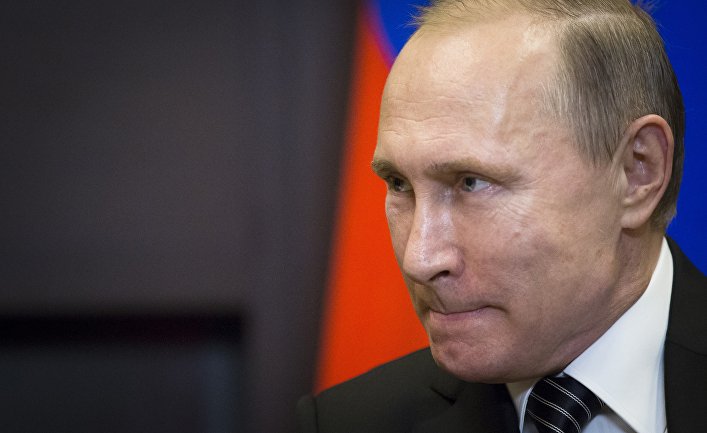Many American observers who keep close tabs on Russia and its position in Syria would claim that President Putin is suffering significant losses at the moment. It's a view that causes confusion among those with direct contact with the diverse nature of the military conflict in the region.
It's obvious that President Putin's intervention in the Syrian conflict didn't presuppose the immediate collapse of the Assad regime. Putin was able to complete a full clean-up of the Latakia Province and its main military bases, to protect them from possible military assaults by opposition groups of guerillas. Over and above that, Putin took the decision to collaborate with the Syrian unionist forces and foreign troops with the intention of putting the Syrian capital unquestionably under the control of President Assad, and clearing the capital of all kinds of unwanted figures.
Today, all the facts point towards a significant coordination of the situation between Moscow, Washington, and a handful of European capitals in the struggle against Daesh and similar threats. There's also collective political action going on, whose ultimate aim is in dragging the Syrian government together with its enemies, and forcing them to hammer out a process of negotiated settlement of the conflict, which would end the war, and begin the process of rebuilding the country.
US Senator Black: "If ISIS has shrunk by 40% then 35% of it is because of Russia #Syria https://t.co/sIoLyvbfE0 pic.twitter.com/GzbTZjm5TW
— the Lemniscat (@theLemniscat) February 6, 2016
For those who believe that Putin is taking a beating for pursuing this foreign policy, it's clear that they more-or-less miss what the actual reality is, and are predicated on what might happen — in the case that Putin lost his reason, and decided to leave the Assad regime in place, batter down Assad's military and political foes, and strike the opposing countries in the region, such as Turkey, Saudi Arabia, and their allies. Even if Russia limited its military intervention to air strikes, and kept out of sending land forces into Syrian territory, Russia would never wish to repeat the catastrophic experience of Afghanistan, with American-armed mujahadeen, revolutionaries, and terrorists armed with cruise missiles. It would mean Putin would be faced with a stark choice – either quit the war entirely, or ramp up his forces in Syria to include both air and surface forces.
Putin's success, which we have already mentioned, does not mean that Russia and its allies are not suffering losses. There have been hundreds of dead and injured. Hezbollah has lost thousands of fighters, not even to mention the losses suffered in the ranks of Assad's forces and allies – Iraq, Iran, Afghanistan, and others. Anyone who is familiar with President Putin's character, or who has analysed his behaviour, will know that if he were to risk losing face, then he would immediately engage more strenuously in the situation, and pump up the action. This policy can stave off losses, or convince people that they've not happened – but only when managed by professionals.
Does the US hope that Putin will become bogged down in the quagmire of the Syrian war? Or would it be more worthwhile for them to help him save face? Of course, the USA wants to help Putin. This is the opinion among American specialists on Russia. The explanation is that he fears losing control of the Syrian situation, yet wary of unleashing full-scale war in the region. Meanwhile he cannot ignore the situation with the NATO alliance, particularly if Turkey starts asking questions to its “dear partner”.
#Ryabkov:US should give up political dictating to better relations with Russia https://t.co/VrO8NevZjQ #diplomatsday pic.twitter.com/FdckdX5SfU
— MFA Russia (@mfa_russia) February 8, 2016
It's not impossible that the worsening relationship between Moscow and Ankara arises in part from Turkish fears that Moscow is threatening its national interests, and trying to reduce its role in the region. Public opinion believes that Barack Obama will try everything possible to save Putin's bacon, by coordinating efforts towards a negotiated peace in Syria – which, if successful, would allow Putin to withdraw from the war with good grace. First views would suggest that Foreign Ministers Lavrov and Kerry are working flat out on the issues of the Syrian crisis – since neither of their countries wants a Middle Eastern repeat of the Afghan fiasco. However, many doubt they will be able to find such a peaceful resolution, despite all the effort Kerry and Lavrov are making. But they are making every appearance of doing so, so that they can later make a gradual exit from the process, and wind-down their involvement.
Serious American governmental sources would agree with the assessment laid out above. Even so, they guard against errors which may have crept into American analyses of Putin's actions – since they are predicated on western values. For example, when they say that Putin will certainly lose if oil prices remain slumped – because the Russian people will take out their anger on the president for the poor economic situation in the country, and the lack of democracy. But Russia thinks in a different way to this. Putin doesn't fear any kind of popular revolt. The economic situation wouldn't lead to any kind of uprising in Russia, because the character of the Russian people is such, that they explain things away as a plot carried out by America and the West, against the Russian people.






